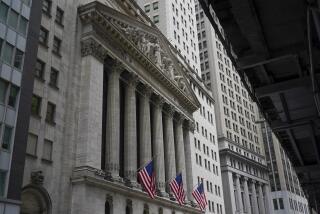Economic Recovery Seen as Key to Reviving Merger Activity
- Share via
Could the $14.2-billion takeover of Household International by banking giant HSBC Holdings spark a resurgence in the moribund merger market?
Many analysts are doubtful, for a number of reasons -- including the uncertain economic environment and the fact that the shares of many would-be acquirers are depressed, making them reluctant to give their stock away.
“Because stock prices are beaten down, firms are still reluctant to merge,” said Sung Won Sohn, chief economist at Wells Fargo & Co. in Minneapolis. “With cash, you are limited. It’s hard to come up with $14 billion in cash. The key is economic recovery that will lead to an increase in stock prices. You need both for merger activity to revive.”
That didn’t stop HSBC from offering stock for Household, however. Though HSBC shares are below their 2001 peak, Household’s stock has been far more depressed, apparently making it a bargain in HSBC’s view.
Still, this year is on track for the lowest dollar-value of announced merger deals since 1994, according to data-tracker Thomson Financial.
Through the third quarter, the number of announced mergers, including those between U.S. companies and those between U.S. and foreign companies, totaled 5,480, down from 6,647 in the same period of 2001, according to Mergerstat.
The dollar value of deals announced was $336 billion in the first nine months of this year, down from $540 billion a year earlier and $1.02 trillion in the same period of 2000.
“It’s too early to tell if this marks a resurgence,” Richard Peterson, analyst for Thomson, said of the Household deal.
Other big deals this year have included Pfizer Inc.’s planned purchase of Pharmacia Corp., announced in July, and Northrop Grumman Corp.’s planned purchase of TRW Inc., announced in February.
Investment bankers are telling their corporate clients that because many companies can be bought for the lowest share prices in years, more deals make sense. Also, the cost of money at banks, or to borrow via high-quality bonds, is at generational lows.
If economic growth remains subpar, industry consolidation should accelerate because companies will need to gain market share, bankers say.
“In a slow-growth economy, the way to create shareholder value could be through consolidation,” said Bob Levitt, co-head of the Western region for investment banker Lehman Bros. in Los Angeles. “For a healthy company, access to capital is quite strong at low rates. There are also some good businesses selling at very low prices.”
“The HSBC transaction is one of the biggest we’ve seen in a long time,” said Mark Clemente, a corporate strategist and co-author of “Winning at Mergers and Acquisitions” (John Wiley & Sons, 1998). “Maybe it will remind CEOs that, when a deal makes sense -- especially one that will significantly bolster a company’s market standing and global capacities, as well as present substantive cost-reduction opportunities -- it should be done.”
But for many CEOs, the bottom line is confidence in the business outlook -- something many corporate chiefs lack.
Earlier this week, a Business Roundtable survey of executives at 150 major companies showed that almost two-thirds expect the economy to grow at a rate of less than 2% next year, far below the 3.2% annual rate of the last decade.
Sixty percent of the CEOs said they expect to cut employment levels in 2003.
“You need CEO confidence for mergers to recover,” investment banker Levitt said. “That’s the hardest to measure, and the most critical barometer.”
More to Read
Inside the business of entertainment
The Wide Shot brings you news, analysis and insights on everything from streaming wars to production — and what it all means for the future.
You may occasionally receive promotional content from the Los Angeles Times.










